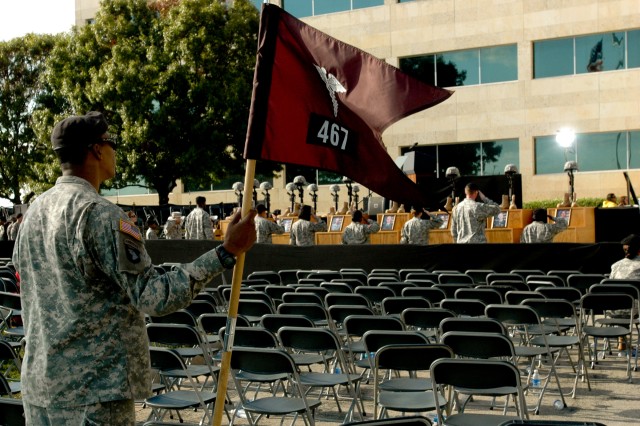
FORT HOOD, Texas (Nov. 7, 2010) - Ironically, some of the Soldiers most deeply affected by the shooting Nov. 5, 2009, knew the most about recovering from shock and grief.
Soldiers of the 467th Combat Stress Control Detachment, an Army Reserve unit based in Madison, Wis., had arrived in Texas Nov. 4 for post-mobilization training with First Army Division West. By the afternoon of the following day, three members of the unit were dead and several others wounded, shot by a gunman as they waited to complete their deployment processing.
Other than happening in what should have been the very least likely place, it was exactly the type of situation the unit's psychologists and behavioral health specialists are trained to deal with. A few weeks later, after completing their training on schedule, every one of the remaining Soldiers of the 467th - except those whose injuries now made them medically non-deployable - boarded the plane for Afghanistan.
Army Chief of Staff Gen. George W. Casey Jr. visited members of the 467th during their overseas tour. During a remembrance ceremony at Fort Hood Friday afternoon, Casey said he was impressed with their resilience.
"I watched members of the 467th Combat Stress Control Detachment - specialists charged with helping others deal with tragedy - as they coped themselves with the loss of three of their own," Casey said. "They were working hard to come to grips with what happened here, even as they poured themselves into helping other Soldiers deal with the stresses of combat. They helped in clinics that they had named for their fallen comrades."
The deployment was actually helpful for a lot of the Soldiers in the unit, said Sgt. Garry Cole, a behavioral health specialist with the 467th.
"It allowed us to kind of take that burden off our shoulders for a time," Cole said. "Our pace was so fast during the deployment that it was difficult to really have to stop and think about that and cope with what we were dealing with. In a way, helping other people is one of those things that makes your coping easier."
Cole said he drew from his personal experience at Fort Hood "all the time" to help Soldiers in Afghanistan.
"It was much easier for me to relate," Cole said. "Obviously, I would have rather not have gone through something like that ... but you might as well use it for something positive, instead of dwelling on something negative."
Cole, who is engaged to be married next April, said a survey at his forward operating base showed that more Soldiers there suffered from "homefront" issues such as marital problems than combat stress.
Although the 467th Soldiers are doing well, Cole said, it's good for them to get home.
"I think, for everyone in the military that gets deployed, the cure for all their symptoms is just to go home," Cole said. "Being with family is an extremely important bonding experience and an important healer, as well."
All of the 467th Soldiers who deployed to Afghanistan safely returned to the United States in late October, a fact the unit's senior enlisted leader, 1st Sgt. James McLeod, is very proud of. Although individual Soldiers could have decided not to deploy with the unit after the shooting, "they all said, 'Yes,' unanimously," McLeod said. "No one wanted to be left behind."
Once the unit arrived in Afghanistan, the 467th Soldiers focused on other Soldiers who needed their help, McLeod said.
"Violence is definitely a bad thing, but you have to accept it sometimes. You have to push forward, even though you don't want to, and our Soldiers were able to do that," McLeod said. "Going through that incident made our Soldiers much stronger and able to support the Soldiers who are dealing with any type of issue."
After the shooting and while the unit continued training at Fort Hood last year, 467th Soldiers were embraced by local communities, especially Gatesville, Texas, McLeod said.
"What can you say about Texas' It's a great place; it's a great state," McLeod said. "The community, as a whole, welcomed us and loved us, and we loved them back. We definitely want to tell them we appreciate the care and the love that they gave us, and that we hope to continue our relationship with them as we move along in time and our careers."
(Sgt. 1st Class Gail Braymen writes for First Army Division West Public Affairs.)

Social Sharing